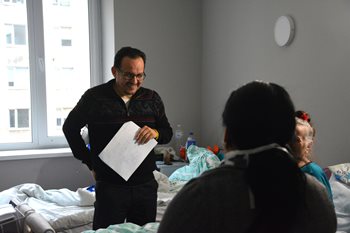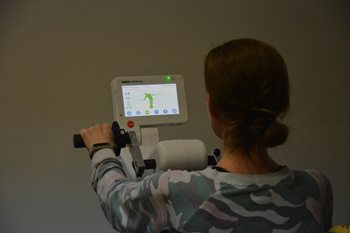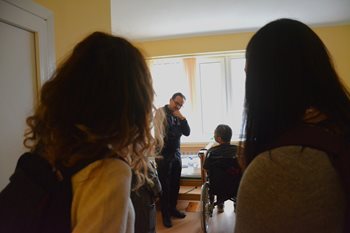 Oleh and his team use these rounds to stay updated on patient progress, meet new patients and access their needs, and learn about each other’s cases. New patients arrive each week on medical evacuation trains. Many have come from communities in the east where hostilities continue to have devastating impacts on civilians.
Oleh and his team use these rounds to stay updated on patient progress, meet new patients and access their needs, and learn about each other’s cases. New patients arrive each week on medical evacuation trains. Many have come from communities in the east where hostilities continue to have devastating impacts on civilians.The first person he visits is a young woman in her thirties who has a brain injury from being hit by shelling in Kyiv. She doesn’t remember exactly what happened to her. As she does physical rehabilitation exercises, Oleh and her therapist check in on her progress. She says she’s been to a few rehabilitation programs before her friends brought her to Lviv, and that this is the best one she’s been to. She’s only been here a few days, but the team will follow her rehabilitation journey, providing psychotherapy support along the way.
Oleh has worked hard to ensure his psychology team is integrated into patient care in the hospital. The inpatients they work with – some injured as civilians, others while serving in the military – have devastating injuries as a result of the international armed conflict. But physical rehabilitation is only part of their journey to recovery; their mental health is just as important.
At the onset of the conflict in February 2022, Oleh’s team consisted of two psychology professionals - one full-time and one part-time.. Seeing the importance of being able to provide mental health services to those dealing with physical injuries because of the armed conflict, Oleh advocated for additional funding for his program. The Canadian Red Cross was able to step in and provide funding for up to 10 psychotherapists.
 As the team follows Oleh around the hospital, we meet patients from all walks of life. There’s a family of three from Bakhmut who were all injured in November when artillery shot through their apartment. The mother and father are staying together in one room while their two-and-a-half-year-old daughter stays at the nearby children’s hospital. She has no feeling in her legs.
As the team follows Oleh around the hospital, we meet patients from all walks of life. There’s a family of three from Bakhmut who were all injured in November when artillery shot through their apartment. The mother and father are staying together in one room while their two-and-a-half-year-old daughter stays at the nearby children’s hospital. She has no feeling in her legs.We meet a number of patients with broken and shattered bones, with external pins holding their limbs together. The lucky ones have family with them, but some haven’t been able to contact theirs, or their families are unable to come meet them. The team social worker comes along on rounds as well; when a patient is unable to contact their family, or is missing their documents, she steps in to try and support.
Oleh explains to us that all of the team’s patients are dealing with post-traumatic stress disorder in some form. For some people, this manifests as depression and anxiety; for others, it means flashbacks and nightmares. These symptoms often come in waves – patients will have a stretch of good days and then a stretch of tough ones.
During the rounds, the team also checks in on families, for those fortunate enough to have some with them. We meet a man from Kramatorsk who has a brain injury and has been here since early January. His wife is staying in his shared room with him. She has no physical injury but upon asking her some questions, Oleh discovers she hasn’t been sleeping, and encourages her to speak to a psychotherapist at the outpatient centre his team also runs.
 At each new patient, Oleh opens by asking how they are, how they’re sleeping. Simple questions that can reveal a lot. He emphasizes the importance of feeling sadness, saying he’s almost more worried about the people that are too optimistic. An important part of mental rehabilitation is feeling and acknowledging difficulties.
At each new patient, Oleh opens by asking how they are, how they’re sleeping. Simple questions that can reveal a lot. He emphasizes the importance of feeling sadness, saying he’s almost more worried about the people that are too optimistic. An important part of mental rehabilitation is feeling and acknowledging difficulties.Sofiya Nevoyt, one of the psychotherapists at the hospital, explains that it’s often hardest for the patients who have been here for long periods of time. It can be demoralizing to be hospitalized for so long – some for many months – especially when they don’t have family with them.
In addition to supporting people staying at the hospital, the team also operates an outpatient treatment clinic. Programming includes talk therapy, art therapy, and full-body therapy. Khrystyna Ruda, the leader of the interdisciplinary team of psychotherapists, tells us that full-body – or psychosomatic – therapy is often used when treating former prisoners of war. After their experiences, they tend to not feel safe in their bodies, and the therapy can help with that.
Dealing with such difficult topics can take its toll on the psychotherapists too. Sofiya says that when she first started the job, she felt she needed help herself because “you hear some very hard moments from [people’s] lives.” The team supports each other though, and Sofiya finds that disconnecting fully at the end of the day helps a lot.
The conflict continues to have an immense impact on people’s mental health, which is what makes the work Dr. Oleh and his team are doing so important. Prioritizing mental health from the beginning will hopefully start to alleviate some of the longer-term impacts. Many of the patients his team works with have long roads to recovery ahead of them, but by addressing mental health rehabilitation at the same time, Oleh and his team hope to help the patients recover more thoroughly.
Click here to learn more about the Red Cross response to the Ukraine humanitarian crisis.
Photos credit: Ukrainian Red Cross Society
Related articles:
Heartbreak and hope: One year of conflict in Ukraine
Volunteering to help after leaving Ukraine
Red Cross in action: How we are reaching people in Ukraine and surrounding countries

